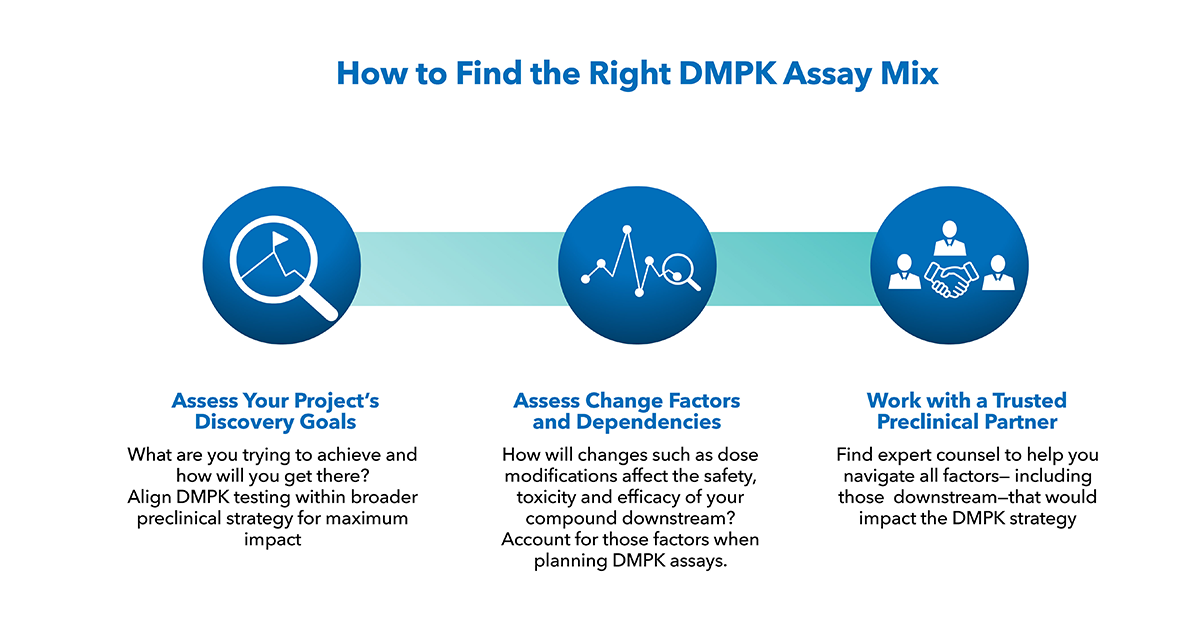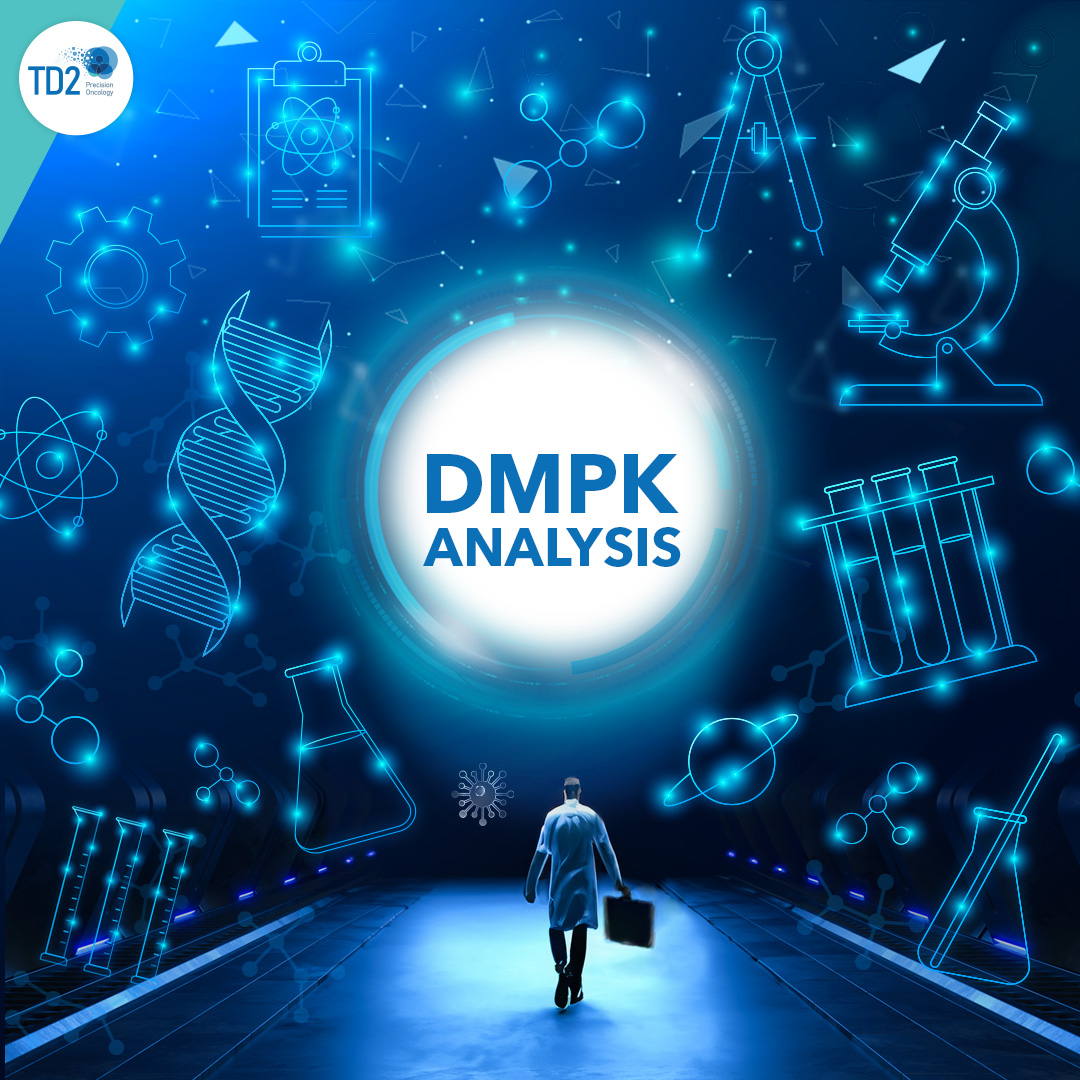Accelerate Your Oncology Drug Development with Complete DMPK Analysis
Discovering safe and effective pharmaceutical agents demands speed and accuracy. At our state-of-the-art facility, we offer in vivo pharmacokinetic (PK) services that allow you to rapidly assess the pharmaceutical and safety properties of your new agents. Experience the power of TD2’s pharmacological and bioanalytical drug metabolism and pharmacokinetics (DMPK) platform, enabling you to confidently select the most robust drug formulations and optimize your drug discovery and preclinical development strategies.
At TD2, we understand that each drug development journey is unique, and we are committed to tailoring our DMPK panel to match your candidate’s specific requirements. Coupled with our state-of-the-art and AAALAC-accredited vivarium, you can trust that every sample analysis and result is conducted with the utmost precision, accuracy, and reproducibility.
DMPK Available Services:
DMPK: Drug metabolism and pharmacokinetics (DMPK) is a core discipline in drug development that considers the biotransformation of a drug compound and other pharmacokinetic properties to assess drug safety.
![]() Method Development and Validation/Transfer
Method Development and Validation/Transfer
- Adherent to FDA guidance for the industry
![]() Analysis of biological samples:
Analysis of biological samples:
- Plasma
- Serum
- Tissues including but not limited to:
- Tumor
- Brain
- Heart
- Kidneys
- Lungs
- Muscles
![]() Analysis of investigational compounds for in vivo studies:
Analysis of investigational compounds for in vivo studies:
- Drug concentration verification
- Efficacy
- PK
Request more information about our DMPK services
Contact our experts to help advance your drug development with TD2's trusted DMPK services.

Figure 1: Mean drug concentration-time curve of XX inhibitor in plasma and tumor following PO administration (5mg/kg) in XX-tumor bearing mice (n = X)
|
Group Lines |
Test Article |
Dose |
Route |
Frequency |
PK Parameter |
Result |
|---|---|---|---|---|---|---|
| 1 | XX inhibitor | 5mg/kg | PO | Once | Rsq-Adj | 0.99 |
| Half-Life (hr) | 2.16 | |||||
| Tmax (hr) | 2 | |||||
| Cmax (ng/mL) | 6588.66 | |||||
| AUC0-last (hr*ng/mL) | 29175.29 | |||||
| AUC0-inf (hr*ng/mL) | 29191.16 | |||||
| AUC %Extrap (%) | 0.05 | |||||
| Vz/F Obs (mL/kg) | 533.09 | |||||
| CI/F Obs | 171.28 |
Table 1: Plasma PK data analysis of the XX inhibitor following a single oral treatment in female nude mice bearing XX subcutaneous tumors.
PK, PD AND BIOMARKERS
Advanced biomarker assays and analytical readouts.
Trust your research with a team of oncology experts that keep the end goal in mind. TD2 helps advance screening studies by offering various specialty assays from tumor immune cell infiltrate profiling to quantitation of the effect of therapy on the microbiome. In addition, access a wide range of standard applications through the cutting-edge MesoScale Discovery platform including:
- Cytokines and chemokines
- Cell signaling pathways
- Angiogenesis and hypoxia markers
- Growth and vascular factors
- Metabolic markers
- Cell based assays
- Phosphoprotein analyses

![]()
PRECLINICAL
Models and Services
TD2’s service offering is consistently expanding and currently includes:
Model Systems:
- Syngeneic Tumor Models
- Orthotopic Tumor Models
- Patient-derived tumor xenograft models (GBM)
- Humanized Mouse Models
- Diet-Induced Obesity Tumor Model
- Adoptive Cell Therapy Models
- Cell Line Derived Xenografts Models (CDX)
Bioanalytical Services:
- Flow Cytometry
- Metabolomics and Proteomics Analysis
- DMPK/ADME services
- Non-GLP Safety/Tolerability
In vivo and In vitro Characterization
- In vitro Pharmacology Assays
- In vivo Optical Imaging
- Efficacy Evaluation
Therapeutic Evaluation:
- Antibody Drug Conjugate (ADC)
- Small Molecule
- Cell Therapy
- Checkpoint Inhibitors
- mAbs
- Vaccines
- Gene Therapy
GET STARTED
Work with a team who believes in your research as much as you do.
Are you ready to start your Flow Cytometry studies? Partner with a collaborative oncology CRO that believes in your treatment as much as you do. Take the first step today and contact our experts.
![]() Protein Binding Analysis
Protein Binding Analysis
Protein binding assays assesses the degree to which drugs attaches to proteins within the plasma/tissue. A drug’s efficacy may be affected by the degree to which it binds. TD2 has validated this assay using the Rapid Equilibrium Device and analysis done by LC-MS.
- Plasma
- Microsomal
- Tumor/Tissue

Figure 3. The process of protein binding assessment with rapid equilibrium dialysis.

Figure 4. Protein binding analysis by equilibrium dialysis of plasma across mutiple different speacies (mouse, rat, dog, monkely, human) following exposure to multiple compounds.
![]() Metabolism
Metabolism
In vitro drug metabolism studies, are a screening mechanism to characterize drug metabolites, elucidate their pathways, to help with further in vivo testing.
- Hepatic Fractions (S9/Microsomes)
- Hepatocyte
- CYP Phenotyping
- CYP Inhibition

Figure 5. Observes relationship between inhibitor (Ketoconazole) and the substrate (Midazolam).

Figure 6. Inhibition Profile for CYP3A4
![]() Permeability
Permeability
Screening tools for the evaluation of a drug’s ability to cross various biological membrane systems in a microplate format.
- PAMPA
- Caco-2

Figure 7. Example of Caco-2 Assay results. Assessment of the permeability of either Metoprolol (highly Permeable) or Quinidine (PgP substrate). A cell monolayer grown on a filtered-well is used to evaluate test compound movement between the insert (apical compartment -A) and the plate well (basal compartment -B). Passive transport through the layer is determine by A-B flux, whereas active transporter will introduce a B-A distribution of compounds between the two compartments.




